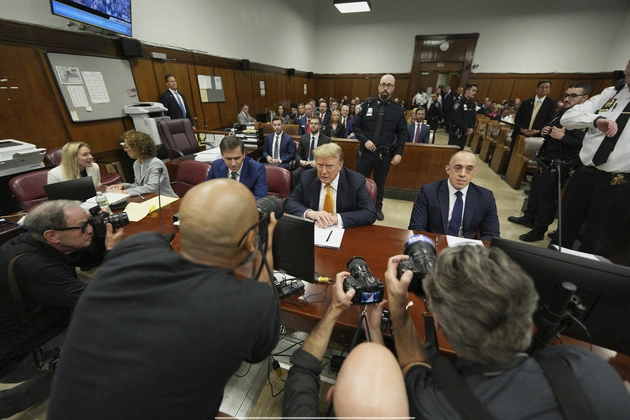
NEW YORK — One year after his criminal conviction in the Manhattan hush money case, Donald Trump is still fighting to shed his felon status.
The president’s personal lawyers appeared before a federal appeals court Wednesday, urging a three-judge panel to transfer his state criminal case to federal court. Such a move would pave the way for him to eventually ask the Supreme Court to erase his criminal record by throwing out his conviction on presidential immunity grounds.
Legal Battle Continues
The arguments continue Trump’s long-running attempt to take the case out of state court, including two previous efforts both denied by a federal judge.
Trump suffered few consequences for his conviction last May of 34 counts of business fraud for his effort to conceal a hush money payment to porn star Stormy Daniels: He won reelection in November and was subsequently sentenced to no punishment in January. But he returned to the White House a convicted felon despite evading the three other criminal cases brought against him.
Presidential Immunity Argument
Trump’s lawyer, Jeff Wall, argued the case should be considered in federal court because the Supreme Court’s decision on presidential immunity, issued more than a month after a New York jury convicted Trump in the hush money case, gave Trump the ability to invoke a law that allows federal officials to move a prosecution out of state court if it involves official conduct.
“The federal officer is entitled to a federal forum, not to have those arguments heard in state court,” Wall, who was acting solicitor general during the first Trump administration, told the panel. “And if that’s true for a normal federal officer in a normal criminal prosecution, it certainly ought to be true for the president of the United States and for what we can all recognize is an anomalous, one-of-its kind prosecution.”
Legal Analysis
Wall argued that the immunity decision meant that evidence or testimony should have been withheld from the trial.
In its decision, the Supreme Court declared that prosecutors generally cannot charge former presidents with crimes, or even introduce evidence, stemming from their official presidential acts.
“There was evidence that came in a trial that triggered an immunity that the Supreme Court recognized after trial,” Wall told the judges. “If an intervening decision of the Supreme Court says that a case is of the kind that should come into federal court, of course you trigger the removal statute.”
Expert Opinions
Wall joined Trump’s legal team in January, along with four other Sullivan & Cromwell lawyers, after Trump elevated Todd Blanche and Emil Bove, the lawyers who defended him during the hush money trial, to high-ranking positions at the Justice Department.
Trump made similar arguments to the judge who oversaw the hush money trial, Justice Juan Merchan, but Merchan ruled that the evidence in question related solely to private, unofficial conduct, and therefore wasn’t covered by the immunity principles.
Counterarguments
Steven Wu, a lawyer in the Manhattan District Attorney’s office, on Wednesday argued that a case can’t be moved from state to federal court after sentencing and that the Supreme Court decision didn’t render the case eligible to be moved in the first place.
Wu told the panel that the purpose of the law that allows a case to be moved is to determine where the trial should take place. “It is not to divert a state criminal proceeding into a federal court for direct appellate review,” he said. “That offends fundamental principles of respect for state sovereignty over the criminal process.”
Future Implications
If Trump were to succeed in moving the case to federal court, that likely wouldn’t affect his ability to pardon himself, said Rebecca Roiphe, a New York Law School professor and former Manhattan prosecutor. That’s because it would still be considered a state conviction even if the forum were to change, she said. But, she acknowledged, “it’s a little bit of uncharted territory.”
Trump is also appealing the conviction itself and is due to file arguments in support of that appeal by late July.











